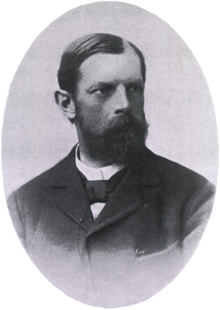Hans Buchner (doctor)
Hans Ernst August Buchner (born December 16, 1850 in Munich ; † April 5, 1902 there ) was a German doctor , bacteriologist and hygienist .

Life
Hans Buchner was the older son of the doctor and coroner Ernst Buchner and his third wife Friderica, née Martin, from Munich. In 1868 he passed the Abitur examination at the Maximiliansgymnasium in Munich . He then studied medicine at the Ludwig Maximilians University in Munich and received his doctorate here in 1873 under the nutritionist Carl Voit (1831–1908) with the thesis "Contributions to the physiology of urea". He then entered the chemical laboratory under Professor Emil Erlenmeyer (1825–1909) in Munich and then moved to Leipzig to the physiological institute of Karl Ludwig (1816–1895), one of the founders of modern physiology. From autumn 1876 to 1881, while working as a military doctor, he carried out bacteriological work in the plant physiological institute of Carl Wilhelm von Nägeli (1817-1891) in Munich. Nägeli, who also managed the botanical garden with laboratories and the greenhouses, carried out research into the extent to which microorganisms can be considered as pathogens for diseases. Hans Buchner was given the task of presenting Nägeli's ideas about infectious diseases in context from a medical perspective. This resulted in his work “The Nails Theory of Infectious Diseases”, which was published in 1877 and received great attention, especially since shortly before Robert Koch (1843–1910) had updated the theory of the development of infectious diseases through microorganisms. This was followed by studies on anthrax, the germicidal effect of blood, the effect of light on bacteria, the culture of bacteria in the absence of oxygen, the question of the patency of the intact tissue for bacteria, the speed of bacterial multiplication and much more.
In 1880 he qualified as a professor for hygiene in Munich and, in 1894, succeeded Max Pettenkofer as head of the Institute of Hygiene, where he introduced bacteriology as a subject. One of his students here was Martin Hahn (1865–1934), who later became co-author. Hans Buchner has published the results of his research on the achievement of immunity against infectious diseases and vaccination in specialist journals, such as in the "Archive for Hygiene" or in the "Zentralblatt für Bakteriologie", and in the medical weekly, but also in book form. Hans Buchner discovered that bacteria are killed by blood serum and the substances that kill bacteria are destroyed by heating to 56–60 ° C. He called this “Alexine” (from the Greek “alexein” = to ward off), a term that is still in use internationally today, while in Germany it has often been replaced by the expression “complement” introduced by Paul Ehrlich . He also dealt with the strengthening of physical health by reducing the susceptibility to illness and its prevention through physical exercise. In 1895 he was elected a member of the Leopoldina .
Hans Buchner was the brother of Eduard Buchner, Nobel laureate in chemistry . From 1882 to the end of 1884, with interruptions in time, Eduard Buchner carried out studies on fissile fungi and the influence of oxygen in fermentation processes at the botanical institute of Carl Wilhelm von Nägeli under the guidance of his brother Hans Buchner . Together with his assistant Martin Hahn, Hans Buchner played a significant role in Eduard Buchner's experiments on cell-free fermentation, which brought him the Nobel Prize.
Hans Buchner married Augusta Stutz in Munich in 1882. In 1884 the daughter Else was born, married the farmer Heinrich Wex and made a name for herself as a politician. Hans Buchner was unexpectedly torn from his work by his death on April 5, 1902 in Munich.
Individual evidence
- ^ Annual report on the K. Maximilians-Gymnasium in Munich for the school year 1868/69
- ↑ Buchner, E.: "About the influence of oxygen on Gorien" , Hoppe-Seylers Zeitschrift für Physiologische Chemie 9 (1885), pp. 380-415.
- ↑ Derek Lowe, Das Chemiebuch, Librero 2017, p. 218
Works
- H. Buchner: The etiological therapy and prophylaxis of pulmonary tuberculosis. 1883.
- H. Buchner: About the bactericidal effect of cell-free blood serum. In: Zbl. Bact. I Dept. Orig. Vol. 5, 1889, 817, Vol. 6, p. 1.
- H. Buchner: Eight lectures from health education (held - except for the latter two - in the winter semester 1896/97 for the Munich Adult Education Association), 2nd revised edition, provided by M [ax] Gruber. Teubner, Leipzig 1903.
- Eduard Buchner, Hans Buchner, Martin Hahn: The zymase fermentation. Oldenbourg, Munich 1903; New edition: Esther von Krosigk (Ed.): VDM Verlag Dr. Müller 2007.
literature
- Obituary. In: Kl von Fritsch (Ed.): Leopoldina. Official organ of the imperial Leopoldino-Carolinische Deutsche Akademie der Naturforscher. Issue 38, year 1902. Halle 1902.
- Karl Kißkalt: Buchner, Hans. In: New German Biography (NDB). Volume 2, Duncker & Humblot, Berlin 1955, ISBN 3-428-00183-4 , p. 705 ( digitized version ).
Web links
| personal data | |
|---|---|
| SURNAME | Buchner, Hans |
| ALTERNATIVE NAMES | Buchner, Hans Ernst August (full name) |
| BRIEF DESCRIPTION | German doctor, bacteriologist and hygienist |
| DATE OF BIRTH | December 16, 1850 |
| PLACE OF BIRTH | Munich |
| DATE OF DEATH | April 5, 1902 |
| Place of death | Munich |